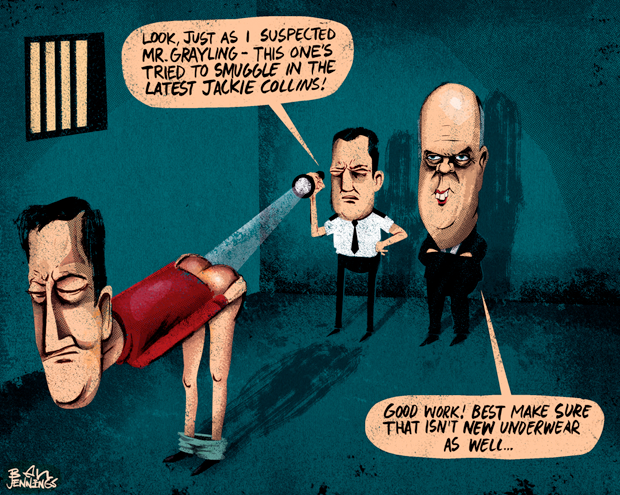
This editorial cartoon was created by Ben Jennings, a participant in Index on Censorship’s young writers / artists programme.
There are people out there who claim they can make things go viral. They are lying.
They are the digital version of economists, confidently asserting they can predict the behaviour of millions of barely-rational people, when nothing of the sort is possible. You can maximise the chances of something going viral but you can’t guarantee it, let alone predict it.
In the last few months, I’ve written about a dying man being deported by the Home Office, the decision to secretly restart removals to Somalia and a Home Office document which admits they have no idea whether their drug policy is working. They do fine, but you can often watch stories you spent time working on go out to the usual liberal minded folk, whirl around for a bit and then die a respectable death, with little to no impact on the wider world.
And then occasionally something explodes. A week and a half ago I saw Frances Cook, of the Howard League for Penal Reform, a brilliant but little-understood campaign group, tweeting about justice secretary Chris Grayling’s Incentives and Earned Privileges scheme, which was brought in last November.
It was part of his attempt to look tough on prisoners, the latest chapter in a seemingly endless cycle of tabloid coverage of supposedly cushy prisoner life, followed by a draconian clampdown by the secretary of state and stubbornly high reoffending rates.
Justice secretaries, like all ministers, are far more interested in the views of tabloids than academic researchers. If they valued the latter, they would build small prisons in the local community so inmates kept regular contact with their families, structure internal learning programmes to improve literacy levels and up-skill people so that they don’t rely on crime once they get out. But they don’t listen to researchers. They listen to tabloids, so they end up trying to flex their muscles, which in Grayling’s case is not an agreeable image.
The purpose of the scheme is to make prisoners earn spending money through discipline and participating in their rehabilitation programme. They can then use this (tiny) amount of money to buy things like toothpaste, underwear or, if they want, books.
Core to this project, Grayling says, is the idea that parcels from family and friends must be stopped. The justice secretary has many reasons for this. Perhaps it is to stop gifts making his earned privileges redundant. Perhaps it is because it is impossible to securely scan all the parcels. Perhaps it is because the parcels are sometimes used for contraband. It is hard to tell, because he is prone to using any number of these excuses as he goes.
But regardless of the reason, the Ministry of Justice banned prisoners receiving books or magazines by mail. Books were now considered a reward, not a tool for rehabilitation.
I asked Frances to write politics.co.uk a blog post on it, with a focus on the restrictions on books. But I was in no particular rush. I figured it would be one of those worthy pieces we publish, which get a bit of an airing and some decent traffic for a couple of days, then respectably fade away. I didn’t bother writing a news story about it, given the policy was actually four months old. When she asked what the deadline was, I was rather flippant. “Whenever really,” I told her. “It’s not very time sensitive.”
I published it late on Sunday morning and went off for lunch. The first sign that something had happened came when I went to the loo and checked Twitter (always a dangerous juggling act). Billy Bragg and Caitlin Moran were tweeting it. ‘That’ll get some traffic in,’ I thought.
By the time I went to bed it has been retweeted by the great, the good and everyone in between. A petition had been launched on Change.org.
I talked to Frances on the phone. For someone from her perspective, it is strange when this happens. Groups like the Howards League deal with stories about people being killed in prison and no-one gives a damn. The campaigners and prison officer groups I’ve talked to have been taken aback by the reaction to the piece, and often not a little frustrated. Perhaps people should be more concerned about the fact that inmates are being locked up two-to-a-cell, forcing them to go through the grim humiliation of going to the toilet in front of each other, one told me.
Their problem was mine too: Why do some issues, which might ultimately be more trivial than others, go viral?
In this case it is to do with the almost-mystical power of books in the middle class imagination.
There is a trivial side to this – the bourgeois pretention around books as idol-worship, typified by the stigma around marking your spot by turning the corner of the page. It is a fetishisation of the book, as if Waterstones were one of those Middle Aged tradesmen flogging you a strand of Jesus’ hair. It’s nonsense. Books are nothing but a machine, a tool to get information from brain A to brain B. They are beautiful, but it is a beauty which survives quite well when stuffed into the back pocket of a pair of jeans or covered in coffee stains.
The novel allows access to characters inner life in a way film never can. It is the most empathetic of art forms. Political books, from Paine to Orwell, weigh heavily in the battle of ideas in a way other mediums struggle to match. Even seemingly turgid course text books stand as a tribute to people’s capacity for self-improvement.
These are all vital functions of the book which inmates could benefit from. But for most of them, the importance of books is more sombre and rudimentary. Two-thirds of ex-offenders have the literacy and numeracy levels of an 11-year-old. What they need, more than anything, is young adult literature – appealing, simply written novels which can improve their core reading skills. Perhaps that sounds patronising. It is not meant to be. It is meant to be realistic.
Supporters of the Grayling policy in government told me I was kicking up a fuss so that some mugger could get his hands on a Harry Potter book. I accepted that proposition proudly. It is important that he does. It will do nothing to encourage him mugging someone and might just have a small role in discouraging it.
Anything that stands in the way of a prisoner reading anything is a lunatic act. It costs them more and it costs us more.
This article was posted on March 27, 2014 at indexoncensorship.org





